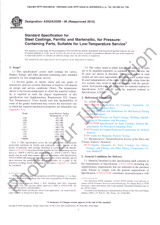Wir benötigen Ihre Einwilligung zur Verwendung der einzelnen Daten, damit Sie unter anderem Informationen zu Ihren Interessen einsehen können. Klicken Sie auf "OK", um Ihre Zustimmung zu erteilen.
ASTM C679-15(2022)
Standard Test Method for Tack-Free Time of Elastomeric Sealants
Name übersetzen
NORM herausgegeben am 1.1.2022
Informationen über die Norm:
Bezeichnung normen: ASTM C679-15(2022)
Ausgabedatum normen: 1.1.2022
SKU: NS-1047408
Zahl der Seiten: 3
Gewicht ca.: 9 g (0.02 Pfund)
Land: Amerikanische technische Norm
Kategorie: Technische Normen ASTM
Kategorie - ähnliche Normen:
Die Annotation des Normtextes ASTM C679-15(2022) :
Keywords:
sealants, tack, tack-free ,, ICS Number Code 83.060 (Rubber),91.100.50 (Binders. Sealing materials)
Ergänzende Informationen
| Significance and Use | ||||
|
5.1?The tack-free time is a measure of the surface cure time and may generally be correlated to a variety of useful parameters such as the time interval before the sealant (1) resists damage by touch or light surface contact, (2) resists job-site or airborne dirt pick-up, (5.2?The tack-free time is sometimes used as an on-the-job quality assurance test. A quality product that is consistent and reproducible will generally fall within a maximum and minimum tack-free time. 5.3?This test for tack-free time can be used at any temperature and humidity. It is important that if a sealant will be used in a climate quite different than the standard conditions called out in this test method, then those conditions be used to test the sealant. |
||||
| 1. Scope | ||||
|
1.1?This test method covers a procedure for the determination of the tack-free time property of single- and multi-component elastomeric sealants commonly used for sealing, 1.2?This test method is applicable to self-leveling and non-sag grades of sealant. Sealants requiring slight heating to facilitate extrusion from the cartridge or gun are also described by this test method. Note 1:?See Specification C920 for type and grade
definitions.
1.3?The values stated in SI units are to be regarded as standard. The values given in parentheses after SI units are provided for information only and are not considered standard. 1.4?This standard does not purport to address all of the safety concerns, if any, associated with its use. It is the responsibility of the user of this standard to establish appropriate safety, health, and environmental practices and determine the applicability of regulatory limitations prior to use. Note 2:?Currently, there is no ISO standard similar to this
specification.
1.5?This international standard was developed in accordance with internationally recognized principles on standardization established in the Decision on Principles for the Development of International Standards, Guides and Recommendations issued by the World Trade Organization Technical Barriers to Trade (TBT) Committee. |
||||
| 2. Referenced Documents | ||||
|
Empfehlungen:
Aktualisierung der technischen Normen
Wollen Sie sich sicher sein, dass Sie nur die gültigen technischen Normen verwenden?
Wir bieten Ihnen eine Lösung, die Ihnen eine Monatsübersicht über die Aktualität der von Ihnen angewandten Normen sicher stellt.
Brauchen Sie mehr Informationen? Sehen Sie sich diese Seite an.




 Cookies
Cookies
